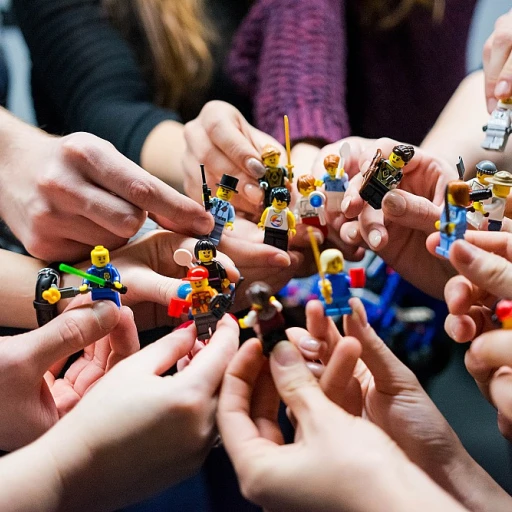
Understanding the Foundations of Teamwork
The Foundation for Successful Collaborations
Understanding the basics of team dynamics is crucial for enhancing teamwork within any organization. Teams consist of diverse individuals, each bringing unique skills and perspectives. To work effectively, team members must share common goals and expectations. This alignment aids in reaching team objectives efficiently. In any workplace, effective communication is an essential skill that underpins successful teams. Good communication fosters open dialogue, facilitates problem solving, and encourages team members to contribute their ideas confidently. It's important to note that encouraging communication requires more than just talking; it involves active listening and understanding diverse viewpoints. Team goals provide a roadmap for what the group aims to achieve. Clear goals promote accountability and allow for the tracking of the progress, helping to review and adapt strategies as needed. With clearly defined goals, teams can exercise decision making more effectively, allocating resources and efforts where they are needed most. Organizational behavior plays a significant role in how teams operate. Understanding these dynamics can help team leaders in tailoring their management skills to create an environment that motivates and inspires their work teams. Additionally, proper team management can help in identifying any existing or potential conflicts early, enabling proactive solutions. Building an effective team also involves learning and development. Encouragement of continuous learning not only enhances individual performance but also boosts overall team performance. By fostering a culture that values improvement, members team become better equipped to handle tasks and overcome challenges. Lastly, understanding the foundations of teamwork also involves leveraging technology to enhance team collaboration. Tools that enable communication, like task management software, can facilitate seamless interaction among team members. Implementing technology ensures that people can work together from anywhere, ensuring productivity and engagement no matter the circumstances. For more insights on how technology can enhance the employee experience, explore this thoughtful resources.The Role of Leadership in Fostering Teamwork
The Influence of Effective Leadership on Team Synergy
Leadership plays a pivotal role in determining how well teamwork functions within an organization. It acts as the glue that binds teams together, ensuring that communication and collaboration occur seamlessly. For leaders looking to foster effective teamwork, certain aspects are critical. First and foremost, recognizing the importance of leadership communication cannot be overstated. Leaders must not only communicate expectations clearly but also engage with their teams regularly to track progress towards team goals. This involves open dialogue, where team members feel heard and valued. In addition, the ability of a leader to identify and promote essential skills, such as problem-solving and decision-making, among team members is vital. By prioritizing these skills, leaders can boost overall team performance and competence. Such an approach should be part of continuous learning within the work environment. Next, providing opportunities for skill development can greatly enhance team dynamics. Whether through personalized training sessions or offering resources like ebooks that enhance team members' management skills, leaders can create an environment that encourages growth and innovation. Moreover, it's crucial for leadership to establish a clear privacy policy and guidelines that protect members’ team interactions. This ensures a safe space where team members can express ideas freely without fear of repercussions, thereby fostering trust and mutual respect. The art of leadership lies in the ability to balance these elements while guiding teams towards shared objectives. By understanding and supporting the various facets of teamwork, leaders not only drive productivity but also contribute significantly to a vibrant workplace culture. For a deeper exploration of how leadership and effective communication strategies enhance teamwork, consider reviewing further resources on enhancing employee experience.Overcoming Challenges in Team Dynamics
Addressing Conflicts with Effective Problem Solving
Teamwork isn't without its challenges, and in any workplace, it's common for teams to face disagreements or different opinions. Team leaders play a crucial role in guiding group dynamics, harnessing communication skills to mediate and address conflicts effectively. It's essential to foster an environment where team members feel comfortable expressing their views while respecting others. Problem solving skills come into play here, enabling teams to navigate obstacles together.
Emphasizing Open Communication
Communication is the backbone of effective teamwork. It bridges the gap between team members and helps in aligning the team goals. Work teams can build and exercise crucial teamwork skills by encouraging dialogue and collaboration. Open discussions also aid in decision making, ensuring that all members team feel their voices are heard. Transparency from those in leadership instills trust, enhancing overall team performance.
Recognizing and Valuing Diverse Skills
Each team member brings unique skills and perspectives to the table which, when combined, create a dynamic and innovative work environment. Team management should recognize and leverage these essential skills, structuring tasks to align with each member's strengths. This not only enhances the team performance but also boosts individual morale and engagement.
Providing Opportunities for Learning and Growth
Promoting continuous learning through workshops, training, or even an engaging ebook can significantly benefit teamwork. It's important for teams to constantly evolve and adapt via developing new skills that can aid in achieving better results. By investing in their development, organizations empower teams to tackle upcoming challenges confidently.
Cultivating a Supportive Work Environment
A supportive workplace culture is fundamental to overcoming team challenges. Encouraging collaboration among team members leads to shared objectives and a collective understanding of organizational behavior. Leaders should actively work on building a culture of teamwork where members feel their contributions are valued, fostering a sense of belonging and loyalty. For those interested in exploring how different roles, like project managers, influence teamwork, exploring opportunities with Marietta City Schools can provide valuable insights.
The Impact of Technology on Teamwork
Technology as a Catalyst for Teamwork
In today's fast-paced workplace, technology plays a pivotal role in shaping how teams collaborate and communicate. The integration of digital tools has transformed the way team members interact, making it easier to track progress, share resources, and enhance overall team performance. However, the impact of technology on teamwork is a double-edged sword, offering both opportunities and challenges.
Facilitating Communication and Collaboration
Effective teamwork hinges on seamless communication. Tools like instant messaging apps, video conferencing platforms, and collaborative software have revolutionized how teams connect, regardless of geographical barriers. These technologies enable real-time communication, allowing team members to engage in problem-solving exercises and decision-making processes more efficiently. As a result, teams can work together more cohesively, fostering a sense of unity and shared purpose.
Enhancing Team Performance Through Data
Technology also provides teams with the ability to track and review their performance through data analytics. By analyzing metrics related to team goals and individual contributions, teams can identify areas for improvement and celebrate successes. This data-driven approach empowers team leaders to make informed decisions, enhancing management skills and boosting overall team performance.
Challenges of Technology in Team Dynamics
Despite its benefits, technology can also pose challenges to team dynamics. Over-reliance on digital communication can lead to misunderstandings and a lack of personal connection among team members. Additionally, the constant influx of information can overwhelm team members, impacting their ability to focus and collaborate effectively. To mitigate these issues, it's essential for teams to establish clear communication protocols and prioritize face-to-face interactions when possible.
Building Essential Skills for the Digital Age
To thrive in a technology-driven workplace, team members must develop essential skills such as digital literacy, adaptability, and effective communication. Organizations can support this by offering training programs and resources that enhance these skills, ensuring that all team members are equipped to navigate the digital landscape successfully.
In conclusion, while technology offers numerous advantages for teamwork, it's crucial for organizations to strike a balance between digital and human interactions. By fostering a culture that values both, teams can harness the full potential of technology to achieve their goals and drive organizational success.
Measuring Teamwork Success
Evaluating Collaboration Outcomes
To effectively measure the success of teamwork, organizations must focus on various dimensions of group performance. Establishing clear team goals is crucial from the outset, guiding members toward a collective vision. This process facilitates better communication and allows members to align their efforts with the organization's broader objectives.
Tracking team performance also involves assessing the essential skills exhibited by team members. By reviewing organizational behavior and management skills, leaders can identify areas where individuals excel and where improvement is needed. This provides a basis for ongoing learning and development, ensuring that skills critical to effective teamwork are honed continuously.
Implementing Performance Metrics
Measurement of teamwork success often requires a mix of quantitative and qualitative approaches. Quantitative metrics might focus on task completion rates or efficiency, while qualitative assessments can provide insights into team dynamics and communication effectiveness. Regular reviews help in fine-tuning strategies and adapting to evolving workplace needs, making it a continuous exercise in improvement.
Technology plays a significant role in tracking and measuring teamwork achievements. Digital tools can facilitate performance management, providing real-time data that aids decision making. These tools not only bolster the efficiency of tracking mechanisms but also ensure transparency and accountability within teams.
Feedback and Continuous Improvement
Soliciting feedback from team members is integral to understanding how well a team performs. It fosters an environment where members are encouraged to voice their concerns and suggest improvements. Regularly exercising this practice leads to strengthened team skills and promotes a culture of collaboration and openness.
Leadership is instrumental in promoting and facilitating these feedback loops. A supportive management framework ensures that insights gathered from feedback are acted upon effectively, driving enhancements in teamwork performance. For teams to achieve sustained success, collaboration between leadership and team members is paramount.
In summary, measuring teamwork success hinges on evaluating both performance metrics and qualitative insights. This comprehensive approach allows organizations to refine strategies and cultivate an environment conducive to teamwork, ultimately enhancing overall performance.
Building a Culture of Teamwork
Creating a Teamwork Support System in the Workplace
Fostering a supportive environment is key to building a culture of teamwork. One approach is integrating regular activities that enhance team members' skills and understanding. Implementing exercises that emphasize problem-solving and communication will cement effective teamwork.- Organizational Behavior and Problem Solving: Encourage teams to collectively navigate challenges. This helps in building essential skills that are crucial in decision making and bolsters communication, leading to better group dynamics.
- Management Skills Development: Proactive leadership that nurtures these skills in team members can dramatically increase team performance. Leaders also play a significant role in managing group interactions and guiding the team toward reaching their goals.













